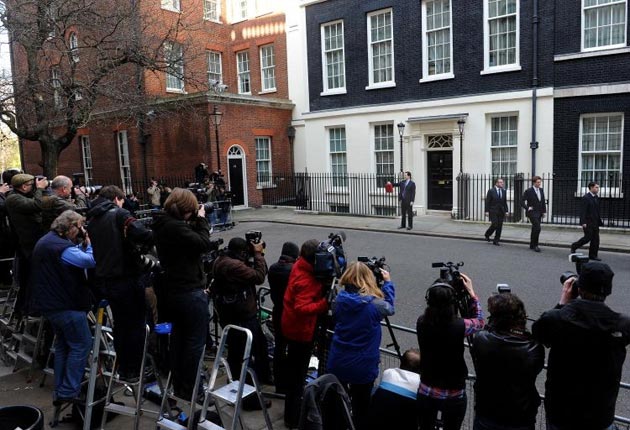Andrew Grice: The Chancellor's game is to lay a tax trap for Labour
Inside Westminster

It may not have been a momentous Budget, but it was more significant than it looked. Through the fog of statistics, the shape of the 2015 general election campaign began to emerge.
When Labour is in power, it tends to define elections as a choice between Labour investment in public services and Tory spending cuts.
When the Tories run the show, they try to offer a choice between their tax cuts and Labour's tax bombshell.
The signs are that 2015 will not be very different. With the fight to clear Britain's massive deficit barely beginning, it may seem premature to talk tax cuts. But the best minds in all parties are already turning to them. The T-word is back.
Like Gordon Brown as Chancellor, George Osborne is seen as a grandmaster in the art of political chess, looking several moves ahead as he plots his opponent's defeat. Labour strategists suspect he is laying an elaborate tax trap. They are right. He played down the significance of his review on merging income tax and national insurance, suggesting it is about the "operation" of the two systems rather than bringing in a combined rate. But the Chancellor sees this review as only the first step. Conventional wisdom has ruled out a single payment, which would invite screaming headlines about a 32p basic rate of tax.
Mr Osborne sees things differently. He wants the public to know how much tax they are paying, believing this will make them more likely to support low-tax parties. I wonder which one he has in mind.
There's a long way to go yet, but the Chancellor is aiming to reduce personal and business taxation before the next election and offer more tax cuts in the Tory manifesto. The flagship Liberal Democrat policy to raise the personal tax allowance to £10,000 allows the Tories to say they are helping low- and middle-income earners. The Liberal Democrats seem up for reform too: David Laws, the former Chief Treasury Secretary, floated the idea of abolishing employees' national insurance contributions this week.
Mr Osborne delighted business leaders and his party's MPs by hinting strongly that he wants to abolish the 50p top rate of tax on earnings over £150,000. He is sceptical that it will raise the £3.1bn pencilled in by the Treasury for the 2011-12 financial year, since rich people are good at finding ways round such impositions. A review by HM Revenue & Customs will give a real- time estimate of how much is being raised, which could pave the way for him to scrap the 50p rate in his 2013 Budget. No doubt the Liberal Democrats would need the cover of a more effective raid on the very rich to support him, but Mr Osborne would need to have some cover too. Labour is in a bit of a pickle on the 50p issue. Nothing new there. Mr Brown wanted to promise one at the 1997 election but was blocked by Tony Blair. Ed Balls, the shadow Chancellor and an increasingly powerful force in the Shadow Cabinet, proposed extending the 50p rate down the income scale to £100,000 (to help avoid raising VAT to 20 per cent). He wants to retain the 50p rate, even though the former chancellor Alistair Darling, in a nod to the Blair era, regarded it as temporary when he introduced it. Labour leader Ed Miliband's line is slightly different, saying that scrapping the 50p rate would not be an early priority for any incoming Labour Government.
The politics of taxation also determined Mr Osborne's headline-grabbing Budget nugget. He needed the revenue from the inflation-plus rises in fuel duty in the pipeline he inherited from Labour, but knew that public anger about petrol prices made them untenable.
The Chancellor feared he could lose public support for tackling the deficit unless he addressed the "cost of living crisis" identified by Mr Miliband and symbolised by soaring petrol bills. Remarkably for a Chancellor with no money to play with, Mr Osborne got a hero's reception when he walked into Commons Committee Room 14 to brief Tory MPs four hours after finishing his Budget speech.
The cut in petrol duty was more than many had expected. "It was only a bunny rather than a big fat rabbit but it was a very cuddly one," quipped one senior MP. Labour strategists are working out how to combat what they call Mr Osborne's "cunning plan" for 2015. They are studying how Barack Obama turned the debate on the Republicans' tax-cutting agenda in the US Presidential election from the traditional "for or against" to "tax cuts for whom?"
Stand by for an election at which the parties say they are all tax-cutters now.
Labour may accuse Mr Osborne of pushing tax cuts for ideological reasons – to shrink the state and dismantle public services. More potent, perhaps, would be a charge that the Chancellor's spending cuts, already branded "too far, too fast" by Labour, are designed to suit a political rather than economic timetable.
Mr Osborne, of course, argues that the deficit must be tackled quickly and that the nation does not enjoy the luxury of doing it over two parliaments.
In the end, the Chancellor knows that he will be judged not by his skill at playing political chess but on whether he gets the economics right.
Join our commenting forum
Join thought-provoking conversations, follow other Independent readers and see their replies
Comments